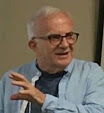I wrote this in March 1991, nearly a year after my visit to the Soviet Union.
“Easter Mob” may sound like an oxymoron, but there is no otherway to describe the mass of humanity compressed within and around the walls of The Russian Orthodox Cathedral of the Ascension in Novosibirsk, Siberia, on Easter Eve. This was the first time in more than 70 that they were permitted to ring the bells, and bells are a huge part of any Russian liturgy. From my vantage point high in the cathedral, I looked out over a vast crowd processing joyfully around the perimeter of the church. They carried torches, bells, crosses, banners and - of course — holy icons.
 It was a curious experience for an American. All night long, people pushed, shoved, and practically trampled me underfoot. I couldn’t get to places I needed to be. Yet I was receiving their warmest welcome, sharing their most sacred moment, made to sit while others stood, and invited to vantage points reserved for only a few.
It was a curious experience for an American. All night long, people pushed, shoved, and practically trampled me underfoot. I couldn’t get to places I needed to be. Yet I was receiving their warmest welcome, sharing their most sacred moment, made to sit while others stood, and invited to vantage points reserved for only a few. From the balcony, I watched the sea of humanity beneath me — babies and babushkas, young military officers and sturdy nuns, the elegantly dressed and the impoverished. The sea moved in waves throughout the main hall. It swirled around circular candle stands. Its chanting sounded like the cresting and crashing of waves. All through the night, the sweetest aromas of incense and melting paraffin competed with the pungent odor of human hair singed by burning candles. No one was alarmed.
Three choirs, a dozen clergy, and the whole congregation moved, sang, prayed, wept, and laughed in a sacred choreography. As the evening progressed, the complexity and grandeur of the liturgy gave way to brief moments of stunning simplicity. Rococo basses and baritones dominated the night but eventually yielded to the stark clarity of a single soprano. She sang from the dome high above the crowd. The music was by Rachmaninoff; the sentiment was ancient and primordial. I do not understand Slavonic, but there could be no doubt: she was the herald of the dawn. She announced resurrection and life, and the rebirth of all that refines and refreshes the human spirit. Her song was an exclamation of hope in the midst of a collapsing empire.
I was told later that this extraordinary vigil was not extraordinary; it has been celebrated similarly every year for more than a millennium, including the darkest years of the Stalinist repression. Certainly I was not to attribute the crowds to glasnost. This mob-like phenomenon was being repeated in twenty congregations — Baptist, Adventist, Lutheran, etc. — all around our sister city, and in countless settings across the former Soviet Union.
At the core of the Judeo-Christian experience is the imperative to choose life. Even in the midst of their present crisis, believers who inhabit the remnants of the Soviet Union are doing this. I will think of my friends in those Siberian churches as we celebrate Easter this year. I give thanks for the faith that unites us and gives us hope.















No comments:
Post a Comment